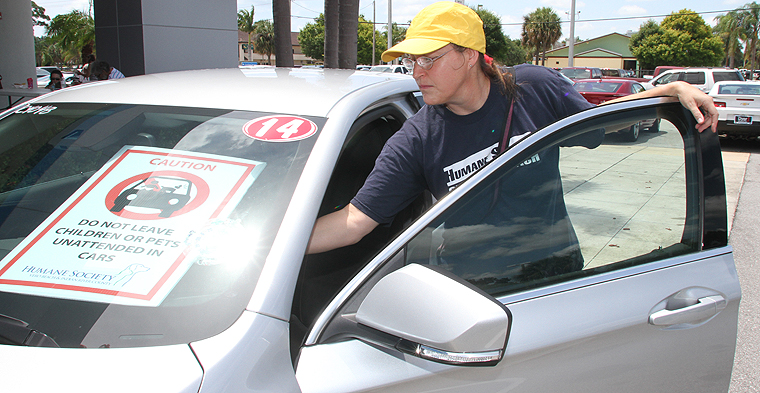
INDIAN RIVER COUNTY — As the summer heat rises, so do the risks of leaving children and pets in vehicles. In order to ensure everyone is taking the heat seriously, the Humane Society of Vero Beach is partnering with Dyer Subaru and the American Society for the Prevention of Cruelty to Animals (ASPCA), in a campaign to remind people that leaving pets and children alone in a vehicle for any length of time can be deadly.
In 2009, tragedy struck Indian River County twice in the form of an infant dying after being forgotten in a car. Between 1998-2013, “68 children in Florida succumbed to heatstroke after being left unattended in hot automobiles,” according to information gathered by the Humane Society.
Over the past year, according to the Humane Society, Animal Control has been called to more than 50 instances in which an animal was left behind in a hot car. The Humane Society estimates that number is low due to many additional calls Animal Control categorizes as “animal in distress,” which could include an animal locked in a vehicle.
Janet Winikoff, director of education at the Humane Society, said their campaign will include bumper stickers, signs in public areas, stickers for the front windows of business establishments, and brochures, all serving as reminders to people who may have left a pet or child in the car.
“The idea is, people will be getting that reminder as they’re walking through the parking lot and into that business,” Winikoff said. “If you’re walking through a parking lot and you’ve left your pet in the car or you’ve forgotten your child and you see a sticker, you’ll remember.”
Another tactic Dyer Subaru is helping with, is installing stick-on thermometers on the inside of vehicle windows that outwardly display the internal temperature of the vehicle to passers by.
“A couple of children in Indian River County in the past couple of years have died,” Winikoff said. She added, phone calls received by the Humane Society about distressed pets alone in vehicles are frequent.
Winikoff said there are many misconceptions about leaving pets or children in a car, which is why the campaign is focusing on education.
“A lot of people will get angry” when they are approached by a stranger about leaving a pet in the car. Additionally, Winikoff said she often hears people justify leaving their animal in the car if they are only going to run into a store for a few minutes, or if they leave the windows cracked.
What people frequently fail to realize, according to Winikoff, is that shade, time of day, and the duration an animal or child is left alone, has little to do with the car heating up to extremely dangerous temperatures.
Winikoff pointed to material provided by RedRover.com, a Sacramento, Calif.- based organization dedicated to bringing animals out of crisis. Part of that material included a video demonstrating how deadly a car’s internal temperature can be for animals.
In the video, animal control records the temperature inside a car sitting for 10 minutes in 77-degree weather at 98 degrees. After an hour, the outside temperature rises to 90 degrees, and animal control records an internal temperature of 161 degrees.
When asked what a dog would be experiencing in a car at similar temperatures, the animal control representative replies, “nerve damage, heart problems, brain damage, and eventually death.”
Cracking windows, the video explains, does not do anything to improve the situation.
The Humane Society also uses a study reported in the Official Journal of the American Academy of Pediatrics to get its point across.
The study concludes, “vehicles heat up rapidly, with the majority of the temperature rise occurring within the first 15 to 30 minutes. Leaving the windows open slightly does not significantly slow the heating process or decrease the maximum temperature attained.”
Even on relatively cool days, children and animals left in a vehicle are at great risk of heat stroke, according to the same study.
The best way to avoid a tragic accident is to simply never leave any child or animal in a car alone, no matter the season, temperature, or circumstance.



